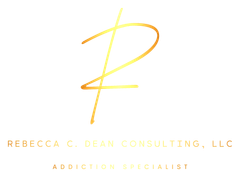ABOUT US
I am an experienced professional who is dedicated to making my clients’ visions for success a reality.
At Rebecca C. Dean Consulting, LLC, I work with each client to develop strategies that are aligned with their treatment goals. Whether you’re wanting moderation or complete abstinence, I will partner with you to help you meet your lifestyle goals. Your success is mine too. You can count on my unwavering dedication to serve your needs. I make use of several psychological theories and methods when instructing clients; however, it is the Existential Psychotherapy approach that solidifies my orientation to instructing. Existential psychotherapy is neither an independent nor separate school of therapy, nor is it a precisely defined model with specific techniques, rather it is based on philosophical views about the essential nature of the human existence. I currently collaborate with a M.A.T. doctor who prescribes TSM and Naltrexone to his patients.
I am a Licensed Addiction Counselor and I also hold 11 Certifications to include: Master Addictions Counselor, Substance Abuse Professional, Certified Clinical Forensic Counselor, Medication Assisted Treatment Specialist, Clinical Supervisor, Certified Anger Management Specialist, Certified Domestic Violence Counselor, National Certified Harm Reduction Coach, TSM Coach and Certified Telehealth Practitioner. I am also a SMART Recovery Facilitator in Beaufort, SC. I have worked at many levels of addiction treatment including detox units, intensive inpatient treatment, intensive outpatient treatment, and medication assisted treatment.
If you are ready to change your drinking, I can help!
I recommend Rebecca C. Dean Consulting, LLC for her outstanding service. She is attentive and an expert at what she does.
- Carolyn S.
What is TSM?
The Sinclair Method (TSM)
The Sinclair Method (TSM) is a treatment for alcohol addiction that uses a technique called pharmacological extinction—the use of an opiate blocker to turn habit-forming behaviors into habit-erasing behaviors. The effect returns a person’s craving for alcohol to its pre-addiction state.
TSM consists of taking an opiate blocker one hour before your first drink of the day for the rest of your life as long as you continue to drink. The opiate blocker chemically disrupts the body’s behavior/reward cycle causing you to want to drink less instead of more.
The Sinclair Method has a 78% long-term success rate.*
Studies have proven that TSM is equally effective with or without therapy, so patients can choose whether or not to combine TSM with therapy. The physical results will be the same.
** Extinction usually occurs within 3-4 months.***
About one quarter of those on TSM become 100% abstinent. Those who continue to drink will have to take their medication prior to drinking for as long as they continue to drink.
Notes
*Most other treatments claim a 5-15% success rate. **All other treatments for alcohol dependency fall into one of three categories: attempting to manage the desire to drink; chemically suppressing the craving to drink, like a diet pill; or making drinking so miserable the person doesn't want to drink anymore. ***As with any medical treatment, patient results may vary. Dosage changes should be discussed with a physician.
Contact Us
What is Extinction in TSM?
What could cause a person or animal to stop engaging in a previously conditioned behavior? Extinction is one explanation. In psychology, extinction refers to the gradual weakening of a conditioned response that results in the behavior decreasing or disappearing. In other words, the conditioned behavior eventually stops.
For example, imagine that you taught your dog to shake hands. Over time, the trick became less interesting. You stop rewarding the behavior and eventually stop asking your dog to shake. Eventually, the response becomes extinct, and your dog no longer displays the behavior.
Causes of Extinction and When It Occurs
In classical conditioning, when a conditioned stimulus is presented alone without an unconditioned stimulus, the conditioned response will eventually cease. For example, in Pavlov's classic experiment, a dog was conditioned to salivate to the sound of a bell. When the bell was repeatedly presented without the presentation of food, the salivation response eventually became extinct.
In operant conditioning, extinction occurs when a response is no longer reinforced following a discriminative stimulus.
Examples of Extinction
Let's take a closer look at a few more examples of extinction.
Imagine that a researcher has trained a lab rat to press a key to receive a food pellet. What happens when the researcher stops delivering the food? While extinction will not occur immediately, it will after time. If the rat continues to press the key but does not get the pellet, the behavior will eventually dwindle until it disappears entirely.
Within TSM, “extinction“ refers to the end of a person’s addictive relationship towards alcohol. In many cases, addiction develops because of the reward system in the human brain: When we do something that feels pleasurable, our nervous system remembers it, and encourages us to do it again. If we repeat this behavior often enough, it becomes a learned pattern, and harder to break.
This is especially true when it comes to substances, and is one of the main reasons people continue having strong cravings for alcohol long after physical detox is complete. The reason TSM works for so many people is that it reverses this learning process. The brain unlearns to associate alcohol with pleasure, day by day, week by week, until it no longer craves alcohol. This is the exact meaning of “extinction” within the Sinclair Method.
Extinction Doesn't Mean It's Gone Forever
If the conditioned response is no longer displayed, does that really mean that it's gone forever? In his research on classical conditioning, Pavlov found that when extinction occurs, it doesn't mean that the subject returns to their unconditioned state.
Allowing several hours or even days to elapse after a response has been extinguished can result in the spontaneous recovery of the response. Spontaneous recovery refers to the sudden reappearance of a previously extinct response. Meaning....every time you plan to drink, you have to take your Naltrexone or else your conditioning will quickly return.
